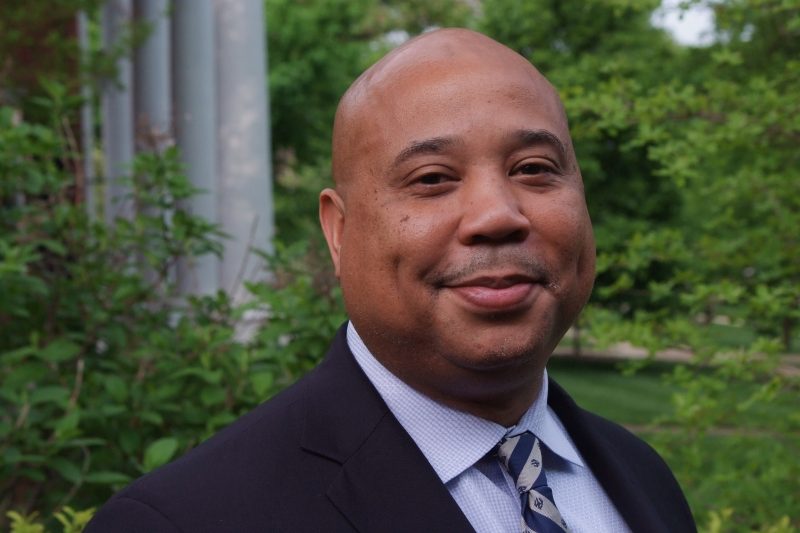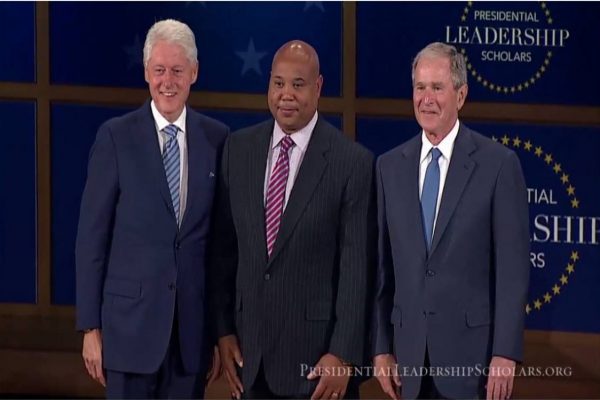What Makes A Great Leader? As a Presidential Leadership Scholar, Dana Bolden '89 discussed effective leadership styles with Presidents Bush and Clinton.
Dana Bolden, a member of W&L’s Board of Trustees, is creating a web portal to identify and develop high-potential minorities for service on Fortune 500 Boards of Directors. The portal will aggregate available resources with input from active minority board members on how to stand out and be better prepared for corporate board service.
He is global chief communications officer at Corteva Agriscience™, The Agriculture Division of DowDuPont. Bolden majored in journalism at W&L.
Q: You recently completed a six-month stint in the Presidential Leadership Scholars Program. Tell us about it, and why was it important for you to participate?
Life-changing would be an understatement. Initially, you are astounded by the caliber of the folks in your cohort. They are some of the most accomplished people in the world — from people changing the way healthcare is delivered in inner-cities to people bringing solar power to under-served communities around the world. We had Ph.D.s, M.B.A.s, M.D.s and J.D.s, alongside military veterans, elected officials and business leaders, all committed to doing their part to improve the world. Finding yourself among these individuals would be overwhelming in and of itself, but when you add in Presidents George W. Bush and Bill Clinton, who were more than generous with their time, as well as their respective staffs and those of presidential libraries (Bushes 41 & 43, Clinton and LBJ), it suddenly became overwhelming.
After a few sessions, it became abundantly clear that people left agendas and egos aside. Everyone was there to help US! I mean, here I am, a kid from the wrong side of the tracks, cracking jokes and getting advice from President Bush (43) about how I can effectively implement my project.
It was important to me to see the many types of leadership that led our country. Each offered tangible lessons on how I could lead in my professional life and, more importantly, my Presidential Leadership Scholars (PLS) project.
Q: How did this program change your perspective of effective leadership?
Prior to the program, I had a distinctive style of leadership and was fairly rigid in my style. That resulted in people who didn’t fit or emulate my style not lasting very long on my teams. PLS taught me how to flex my leadership style and adapt to the talent in my organization, as well as the demands of the times. I’d always thought your style was your style. Leaders hold principles and values but they also evolve to changing times and workforces.
Q: How will what you learned help you recruit minorities to Fortune 500 boards?
One very tangible way is through my cohort and the faculty of PLS. I’ve had personal introductions to roughly half of the people of color serving on Fortune 500 Boards. With the PLS experience next to my name, not one person I’ve called or written has ignored or rejected my requests. Yes, there is a very real and legitimate need for the work we’re doing, but I’d be a bit naïve if I thought that I could call any of the individuals to whom I’ve been introduced through PLS and expect the same level of response if I did not have the benefit of those introductions. Less tangibly, I’ve been able to develop a strategy for what’s next after we get our effort up and running. Our effort, The Director Project (http://thedirectorproject.com), is still in the early stages while we collect and catalog interviews with current board members and build our database of talented minority, C-suite candidates.
Q: What changes, if any, will you make to your approach to managing others?
Those who know or work with me know that I’ve rarely embraced the softer side of management in terms of taking time to understand what motivates people and brings out their passions. My professional life has always been guided by simply coming in each day and attacking the objectives. Many would have said my decisions, in the past, were fairly autocratic. Given that my teams now span different age groups and backgrounds, I’ve invested more time in getting to know what drives people and why they work. Initially, it was very uncomfortable for me, but each day gets a little more comfortable, and the team I currently lead is one of the highest performing I’ve led in my career.
Q: What did you talk about with the former U.S. presidents, and what was the most valuable advice they offered you?
President Bush (43) and I had a very jovial relationship. We were surprised to have a few mutual friends, including Jamie Small ’81. President Bush (41) was there during the early stages, as were both Barbara and Laura Bush. Both Presidents Bush and Clinton were very active during the program and shared a lot of advice. I wouldn’t want to violate the nature of the program by sharing too much of what was discussed. I can say, however, that President Bush (43) probably had the highest conversion rate of any leader during the program. People had very strong opinions of him prior to the sessions. In our small settings, his compassion, wit and smarts converted even the most ardent skeptics. Preconceived notions are very powerful, and social media further enables those notions. The most valuable thing I learned in speaking with both presidents is that personal relationships will always matter, so step out of your comfort zone and make a conscious effort to get to know people with different opinions and views.
Q: Is there any advice you’d offer W&L in its recruitment of under-represented groups to serve either as chapter presidents, or on the Alumni Board or the Board of Trustees?
My advice may be a bit too late! We’ll likely look back and remember 2018 as a year of great change with regard to minority student leadership, engagement and admittance for W&L. Elizabeth Mugo ’19 was elected as EC president, and I expect us to continue to move toward a truly inclusive campus environment. My advice would be to keep pressing forward. We can build from this positive momentum or we can claim victory and sit back. The latter would truly be a mistake.
Q: Any advice/words of encouragement to students on getting involved in student governance?
There are many opportunities on campus to serve and help build our institution into one that remains attractive to bright, diverse groups anywhere in the world. My advice to students is very simple: Get out of your comfort zone and engage with a wide variety of groups. The university has invested in a number of platforms that allow everyone to find a place they can feel like they belong. I’d like W&L to be recognized as a place where people of all backgrounds come to find shared value, not to disappear into echo chambers where their points of view are only reinforced. Very few schools are like ours, so take advantage of these opportunities because there are very few places in the world that allow you to try just about anything you want to accomplish without fear of failure.
If you know any W&L alumni who would be great profile subjects, tell us about them! Nominate them for a web profile.
 W&L Trustee Dana Bolden
W&L Trustee Dana Bolden Dana Bolden with Presidents George W. Bush and Bill Clinton.
Dana Bolden with Presidents George W. Bush and Bill Clinton.
You must be logged in to post a comment.